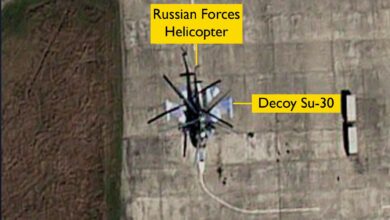
As the war in Ukraine nears its third year, with costs mounting and gains stagnating, Washington’s peripheral security assistance remains just enough to keep Ukraine in the fight — temporarily.
It is also just enough for the US to appear to satisfy its commitments to the 1994 Budapest Memorandum, in which Kyiv relinquished its nuclear arsenal in exchange for American security assurances.
But as Congress spends billions of taxpayer dollars sending weapons to Ukraine — some of which arrive incomplete, inoperable, or both — the Biden administration must consider the mounting costs of supporting a war with no identifiable end in sight.
Damage Control
If Washington insists on continuing its support to Ukraine, it would be wiser to redirect that money toward brokering a peace deal than to continue investing in a broken arms transfer system that will not, in itself, end the war.
Via the Budapest Memorandum, the US promised to help defend Ukraine if it came under future attack. Before Vladimir Putin’s full-scale invasion in February 2022, conflict in Ukraine began in 2014 when Russia invaded and annexed Crimea.
Despite multiple acts of Russian aggression, the US has remained comfortably on the sidelines, sending weapons today to meet its promises of yesterday.
The international community looks on, with some reason to doubt future American security commitments. With the benefit of hindsight, Ukraine’s denuclearization was a bad bet.
More significantly, though, the current situation all but guarantees no state will willingly denuclearize again. If anything, the Budapest Memorandum and the Ukraine war serve as a stark reminder that disarmament on the basis of security assurances from stronger states is not now — nor was it ever — a pathway to indefinite security for weaker states. And Washington has some damage control to do.

Global Security Architecture
Washington’s condemnation of Russia’s war through congressional resolutions amounts to nothing more than finger-wagging from afar. Sloppy weapons provisioning also does little to end the war.
Touting the virtues of liberalism and the rules-based international order — principled on respect for sovereignty — is a waste of oxygen while we watch a belligerent state scoff at the “rules” the US lauds. It also undermines the global security architecture that these rules are meant to preserve.
The US owes Ukraine more than rhetoric and a half-baked attempt at security assistance; it owes a tangible commitment to rectify what is, at least right now, a response characterized more by platitudes than protection.
Economic Incentives
Since the war shows no signs of stopping, economic incentives may be the only remaining viable off-ramp worthy of Moscow’s consideration.
A struggling Russian economy would benefit from renewed energy exports, with oil and natural gas accounting for 36 percent of Russian energy revenue. Kyiv’s alleged September 2022 retaliatory attack on the Nord Stream 2 pipeline weakened Moscow’s natural gas export basis.
A reestablished Nord Stream 2 pipeline — and a strengthened Russian energy export market — may be a ticket out of the war, likely with other incentives to accompany the deal.
With this, Washington should consider how long it wants to remain committed to a weapons provision program that thus far has done little to deter Russian aggression, much less end the war.
If anything, US security assistance to Ukraine has prolonged the war by providing Kyiv with defensive means sufficient to extend its combat operations — but not enough to prevail.

‘Pay for Peace’
Instead of arguing over whether to provide aid to Ukraine, Washington should adopt a pragmatic “pay for peace” transactional approach to end the war.
The US should attempt to broker a deal with Ukraine and Russia involving (1) US financial assistance to rebuild the Nord Stream pipeline in exchange for Russian cessation of hostilities and withdrawal, (2) a tax on Russian energy exports from the rebuilt pipeline, and (3) redirecting this tax revenue toward rebuilding war-damaged regions of Ukraine.
For Moscow, the deal offers a diplomatic and economic carrot in acknowledging Russian strategic interests in the Nord Stream pipelines. It incentivizes cooperation through proposed Russian economic gain and revitalized agreements with a NATO ally (Germany) in exchange for troop withdrawal and respecting Ukraine’s sovereignty.
It would reinvigorate the Russian markets and extend an olive branch to the economically starved country.
Post-War Reconstruction
For Kyiv, the deal serves as a pathway to subsidized post-war reconstruction. Ukraine stands to lose some economically through a rebuilt Nord Stream since the line bypasses Ukraine and excludes Kyiv from its share of a lucrative energy export market.
However, the realized gains outweigh the unrealized losses. In this case, Ukraine needs to choose: accept unrealized profit loss from a rebuilt Nord Stream 2 in exchange for the cessation of hostilities and subsidized rebuilding or risk continued losses across all facets with no end in sight.
From a utilitarian view, the better deal is accepting Washington’s proposal to rebuild the pipeline and funnel tax revenue toward rebuilding Ukraine rather than continuing to fight a protracted war with a militarily superior, nuclear-armed adversary, an option with less to gain and more to lose in the end.
For Washington, brokering the deal serves as a practical method for the US to aid Ukraine and protect its sovereignty, loosely consistent with Budapest Memorandum assurances.
More importantly, it enables Washington to anchor to a finite financial agreement with tangible conditions and timelines rather than open-ended, unfettered spending commitments.

Transactionalism Will Prevail
This war reminds us that we live in an anarchic world devoid of a central governing authority, where signed agreements mean little in self-serving power politics. Security assurances are not guaranteed and do not obligate the guarantor to act.
Russia’s continued belligerence toward Ukraine, coupled with US inaction, shatters the hopes many idealists had for global denuclearization. It is time to accept reality and seek a way out.
Today’s global security landscape requires pragmatism and realpolitik. Transactionalism, not idealism, will prevail. International agreements are merely words, only as good as the intent at the time of signing. As time goes on, promises fade and interests emerge.
In the end, nobody wins in the proposed deal, so states need to determine how much they’re willing to lose in order to end the war — and perhaps gain something in exchange.
 Ryan Burke, Ph.D., is a professor in the Department of Military & Strategic Studies at the US Air Force Academy, the co-director of Project 6633 at the Modern War Institute at West Point, and a veteran US Marine Corps officer.
Ryan Burke, Ph.D., is a professor in the Department of Military & Strategic Studies at the US Air Force Academy, the co-director of Project 6633 at the Modern War Institute at West Point, and a veteran US Marine Corps officer.
The views expressed here are those of the author and do not reflect the official position of the Department of Defense, Air Force, the US Air Force Academy, or any of the author’s other organizational affiliations.
The views and opinions expressed here are those of the author and do not necessarily reflect the editorial position of The Defense Post.
The Defense Post aims to publish a wide range of high-quality opinion and analysis from a diverse array of people – do you want to send us yours? Click here to submit an op-ed.










